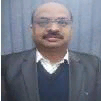
Deepak Kumar Singh
Work place: Integral University Lucknow, India
E-mail: deepak.iiita@gmail.com
Website:
Research Interests: Type Systems, Operating Systems, Artificial Intelligence, Computer systems and computational processes
Biography
Dr. Deepak Kumar Singh from India did his PhD form IIT Kanpur. He is currently Associate Professor at Integral University Lucknow India; his Area of Interest includes Artificial Intelligence, Expert system. He has guided many M. Tech theses and currently various PhD scholars are enrolled under his able guidance. He has Published Papers in various national, International journals and conferences.
Author Articles
Robust Assistive Reading Framework for Visually Challenged
By Avinash Verma Deepak Kumar Singh
DOI: https://doi.org/10.5815/ijigsp.2017.10.04, Pub. Date: 8 Oct. 2017
The Main objective of this assistive framework is to communicate the textual Information in the image captured by the Visually Challenged person as Speech, So that the Visually Challenged person can acquire knowledge about the surrounding. This framework can help Visually Challenged person to read books, magazine, warnings, instructions and various displays as well by taking their image along with the surrounding. Then the Optical Character Recognition (OCR) extracts and recognizes the text in the image and generates the text file. This text file is further converted to Speech with the help of Text to Speech (TTS) Synthesis. The inherent problem with the previous approach was if the acquired image is affected with the issues of different lighting conditions, noise and issue of Skew and Blur, as the image is captured by Visually Challenged person. Then the overall accuracy of the system was at stake due to inefficient OCR leads to improper Speech output of TTS Synthesis. In this paper we have introduced two more processes that are deblurring using Blind Deconvolution method and Pre-processing operation to remove the effect of noise and blur. Thus it prepares the image for efficient result of the framework for Visually Challenged. The proposed approach is implemented in Matlab with the image captured manually and taken from the internet and the result along with the OCR text file and corresponding output Speech shows that our framework is better than the previous framework.
[...] Read more.Text Deblurring Using OCR Word Confidence
By Avinash Verma Deepak Kumar Singh
DOI: https://doi.org/10.5815/ijigsp.2017.01.05, Pub. Date: 8 Jan. 2017
Objective of this paper is to propose a new Deblurring method for motion blurred textual images. This technique is based on estimating the blur kernel or the Point Spread Function of the motion blur using Blind Deconvolution method. Motion blur is either due to the movement of the camera or the object at the time of image capture. The point spread function of the motion blur is governed by two parameters length of the motion and the angle of the motion. In this approach we have estimated point spread function for the motion blur iteratively for different values of the length and angle of motion. For every estimated PSF we perform the Deconvolution operation with the blurred image to get the non- blurred or the latent image. Latent image obtained is then feed to an Optical character recognition so that the text in that image can be recognized. Then we calculate the Average Word Confidence for the recognized text. Thus for every estimated Point Spread Function and the obtained latent image we get the value of Average Word Confidence. The Point Spread Function with the highest Average Word Confidence value is the optimal Point Spread Function which can be used to deblur the given textual image. In this method we do not have any prior information about the PSF and only single image is used as an input to the system. This method has been tested with the naturally blurred image taken manually and through the internet as well as artificially blurred image for the evaluation of the results. The implementation of the proposed algorithm has been done in MATLAB.
[...] Read more.Other Articles
Subscribe to receive issue release notifications and newsletters from MECS Press journals